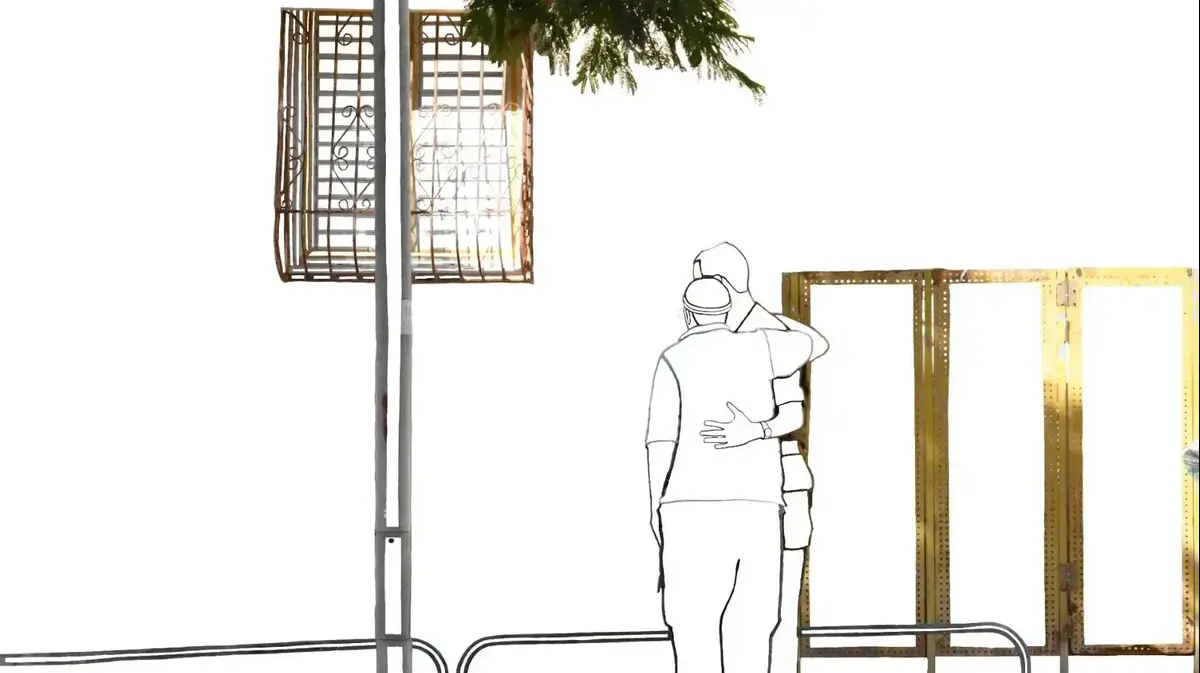Enlarge image
Photo: Friedemann Vogel / EPA
Four weeks after the flood disaster in the Ahrweiler district, it still looks like a bombardment there.
Excavators and trucks drive on the main road through the Ahr valley, full to the brim with rubble.
The railway tracks hang in the air along the river, the embankment has been washed away in many places, massive bridge piers lie twisted in the river bed.
The clean-up work is ongoing, and helpers from all over the country are on site.
One of them stands by the roadside and points to the river: "The houses were built far too close to the river."
The bearded man in dungarees has relatives in the area and helps out because he has taken the once beautiful wine region to his heart.
"For the tourists, the terraces and hotels have been built closer and closer to the water," he says.
Now the houses would be rebuilt in the same place.
The reconstruction costs are estimated at 30 billion euros.
A mammoth task that could take years, if not decades.
On Tuesday, the Bundestag wants to pass a billion-dollar aid package for the areas affected by the flood.
But how useful is it to simply rebuild everything as it was before?
"If the funds are only used for reconstruction, not for adaptation to future extreme weather, they are badly invested," criticizes Reimund Schwarze from the Helmholtz Center for Environmental Research (UfZ). Together with over 20 scientists, shortly after the disaster, he published a call for a nationwide climate adaptation program. The sad fate of the Ahr valley must be a lesson from which one can also draw conclusions. "If we were smart, we would turn the Eifel into a showcase project for adapting to climate change," says Schwarze. "Simply rebuilding everything like this would be negligent."
The words climate and adaptation do not appear in the government's draft law for the »establishment of a special fund for development aid in 2021«.
Scientists such as Reimund Schwarze warn that the opportunity to use the funds to make the region climate-proof is unique and more cost-effective in the long term.
Rudimentary adaptation strategy
There is a system in the fact that in the event of a crisis there is media coverage, but adaptation to extreme weather conditions is only a sub-topic of climate policy. Although there are numerous efforts to adapt to climate change in Germany, the topic is hardly present in many municipalities. "We have a fragmentation of adaptation measures," says Schwarze, who advises municipalities in Saxony-Anhalt on this topic. There are many guiding principles and clever advice on the Internet, but the topic is basically "underdeveloped". Many municipalities lacked the funds and the skills.
The "German Strategy for Adaptation to Climate Change" has been in existence for 13 years. This is intended to reduce "the" vulnerability "of German society" and to maintain or "even increase" the "adaptability". But what exactly comes out of it is more something for experts than for practitioners. The budget is also limited: In 2019, the federal government spent just six billion euros on the program. In 2020 it was only just over a billion in the first half of the year, according to a written request from the Greens to the federal government. In the climate program of the Federal Environment Ministry (BMU) no new adaptation programs have been funded since 2019, it says.
There is no Germany-wide master plan on how municipalities can protect themselves from extreme weather, which is becoming more and more common due to climate change.
The Federal Environment Ministry also admits that there is no “central budget title” or “overarching financing instrument for adaptation measures”, a spokeswoman told SPIEGEL.
There are plenty of individual measures for this: Germany-wide around 180 "in all fields of action".
So that the municipalities, which are often clumsy and depleted in terms of personnel, can see through the funding jungle, the ministry only founded a "Center for Climate Adaptation" in July, to which representatives of the municipalities can turn.
In view of the gigantic task of making the whole of Germany crisis-proof, that sounds more like a cumbersome little one.
"Climate change is catching up with us more and more, but our infrastructure is no longer adapted to the new conditions," criticizes the hydrologist Fred Hattermann from the Potsdam Institute for Climate Impact Research (PIK).
It's just too much all at once.
"Our critical infrastructure such as power plants, hospitals and bridges are also endangered by increased extreme events such as heavy rain, storms and floods - and this also increases the risk for people." Road underpass can be derived or what flood the dykes can withstand.
»Retreat« - the person has to give way
It is certain that there will be more catastrophes due to extreme weather.
The current world climate report clearly shows more heat waves and heavy rain for Germany the further the climate crisis advances.
Prevention should therefore be the order of the day if one wants to limit victims and damage.
"The money for adaptation to the climate crisis is not flowing sufficiently into the regions that need it so badly," criticizes Lisa Badum, climate policy spokeswoman for the Green Group.
There is no systematic recording of how much money is available or what it is being spent on.
The Greens in the Bundestag are therefore calling for a climate protection fund of 25 billion euros annually for the whole of Germany to be set up - in addition to the billions in aid for the flood region currently affected.
"The federal government puts the money in the shop window and sees its responsibility fulfilled, but the problem lies in the structures."
Such a central federal fund would at least be a start, according to researchers like Schwarze and Hattermann.
Because the lion's share of the adjustment would have to be shouldered by the municipalities, which would require accessible help.
Most of the measures could only be coordinated on site.
This involves very specific conversions: "It must be ensured that the seal is unsealed, so that as much water as possible can seep away on site and parking lots and streets must be checked to see how much water could drain off in the event of new extreme precipitation." of riverside properties in building land and industrial areas must be treated much more critically.
According to Reimund Schwarze, there is often a lack of a climate manager in the municipalities.
He could stimulate such changes and mediate between the administrative apparatuses.
"In future it must be normal for measures to be checked not only for their climate friendliness, but also for their adaptability," says Mark Lawrence, Director of the Potsdam Institute for Advanced Sustainability Studies (IASS).
"The probability that floods will happen again in vulnerable regions like Ahrweiler has increased many times over and will continue to increase."
But how can you convince people to set up their home somewhere else after such a disaster?
"The question is, what risks are you willing to take in rebuilding," says Lawrence.
This is the moment, with government support, possibly looking for a new, safe place to live.
In the Environment and Climate Ministry of Rhineland-Palatinate, one sees at least an "urgent need for climate adaptation measures".
This also includes "climate-adapted building," a spokeswoman told SPIEGEL.
However, it is still too early for "detailed statements on the reconstruction".
However, it must be carefully checked whether buildings "were in suitable, safe places" and might have to be rebuilt in safe places.
The Ministry also considers an expansion of the floodplain - that is, a withdrawal or "retreat" of people to be sensible.
The UfZ researcher Reimund Schwarze also considers this to be an important but politically sensitive topic: "Of course, decisions must not be made over the heads of people, but it is also about their own safety."
According to the researchers, citizens' councils that are included in municipal planning are also conceivable.
Whether the disaster in the Ahr Valley will also lead to a Germany-wide paradigm shift in climate adaptation is likely to be decided by the next government anyway.















